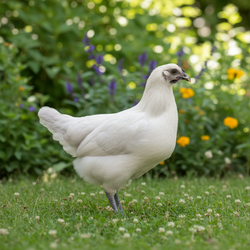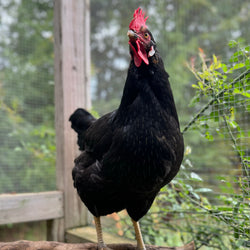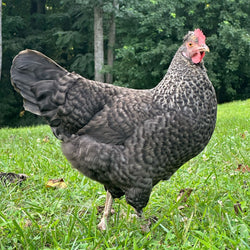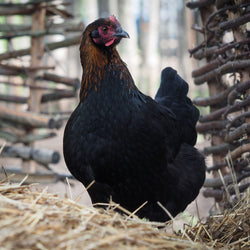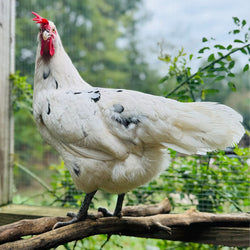page=2/--
Frequently Asked Questions
Here we answer the most commonly-asked questions about ordering, chicken care, and more.
What do I need to know about weasel family predators if I keep chickens?
Name: Weasel, ermine, ferret, mink, badger, fisher, ermine, wolverine, skunk, etc. Mustelidae and Mephitidae spp Description: This group contains diverse predators including those listed above. Those species interested in preying on your chickens generally are small to medium, long-bodied, short-legged omnivorous mammals. Some are tiny; for instance, some weasels aren't much bigger than a mouse, but they can kill rabbits and chickens many times their size. Some members of this group are very large; for instance, wolverines have weighed up to 70 pounds. Distribution/Habitat: Various species are found throughout the world Hunting Behavior: Some in this group are not predators...
Read MoreWhat do I need to know about house cats if I keep chickens?
Domestic house cats very rarely attack adult chickens, but they can be a serious danger to baby chicks, and occasionally to juvenile birds or small bantams. That said, not all are, to be sure. With chicks, it's better safe than sorry, but there are plenty of examples on the interwebs of cats cuddling and loving on baby chicks, like the above. Occasionally we do hear from people whose cats seem interested in their adult birds. Since many of the most common chickens are just as big as house cats, this is pretty rare. If a cat kills an adult chicken...
Read MoreWhat do I need to know about large felines if I keep chickens?
Name: Lynx (including bobcats), Cougar Lynx spp and Puma Concolor Description: *Lynx up to 66 pounds and over 4 feet long (in North America, the species are smaller, up to 30 pounds and 41 inches) *Cougars can be up to 220 pounds and up to 9 feet long (including the tail) Both lynx and cougars are large felines, and can have large paws for their relative size. Lynx have short tails, while the cougar's is long. Various lynx species may be generally golden or pale in color. Their fur may be plain or spotted, and they have lighter fur on...
Read MoreWould crows ever attack or eat my chickens?
Name: Crows and other corvids Corvus spp Description: *Corvids are large perching birds, usually with dark coloration, although some (especially tropical species) can be very brightly feathered. *Some in this group can be up to three pounds Distribution/Habitat: Found throughout the world Hunting Behavior: Crows are among the most intelligent animals, and can even make and use tools. They can also recognize individual people by their faces. If they attack your flock at all, it will probably be an attack of opportunity on chicks, very small bantams or very young birds. They may also be sneaky and try to steal...
Read MoreWould someone ever steal or harm my chickens?
Unfortunately, scoundrels are found everywhere. Most humans are not predators of chickens, of course, but the fact is that some people are dishonest slimeb alls--so if your flock suddenly disappears or is destroyed, don't rule out people as the culprit. We hear from people with neighbors who are so against the whole idea of chickens in a suburban area that the neighbors feel theft or violence is justified. They may do so because they feel it's inhumane, or they may just have a grudge against you. Another motivation is different: some people love chickens so much, that they will steal...
Read MoreDo chickens attract rats?
Chicken feed and droppings will attract rats, yes! That's why it's so important that you do two things: store your feed in metal bins, and carefully prepare your chicken run using a heavy gauge half-inch or less hardware cloth material. Why rats are a problem Some people don't much mind rats lurking around their coop. We get that. It's old school, and we're not here to judge. But there are some very good reasons why you should try to eliminate rats around your chicken coop area. First, rats carry disease and can make your flock--or you--sick. When rodents eat feed,...
Read MoreWhat do I need to know about snapping turtles if I keep chickens?
Name: Snapping turtles Chelydra serpentina or Macrochelys temminckii Description: Snapping turtles are large freshwater turtles . Common snapping turtles weight up to 75 pounds, but generally average around 35 pounds for an adult. Alligator snapping turtles have weighed up to 249 pounds in captivity, but in the wild *only* get to be as large as 175 pounds or so. Still giant! Distribution/Habitat: Found in eastern and southeastern North America Hunting Behavior: These are uncommon predators of chickens, although they may pose problems for you if you have snapping turtles in your area. Females especially are known to travel relatively far...
Read MoreWhat do I need to know about birds of prey if I keep chickens?
As a flock-keeper, it is important to know that birds of prey, including raptors who hunt in daylight like eagles and hawks, and owls who hunt at night, will definitely kill and eat chickens in your flock if given the opportunity. Birds of prey come in many different sizes and colors, and various species are found throughout the world. This article will help you understand their hunting behavior and give you tips to help protect your flock from their aerial assault. How birds of prey hunt Unlike the most ground-bound predators of chickens (which may kill many birds or an...
Read More







"The Clubhouse" Coop
Easy to assemble and built to last, the Clubhouse Coop is the perfect starter coop for a small flock.


